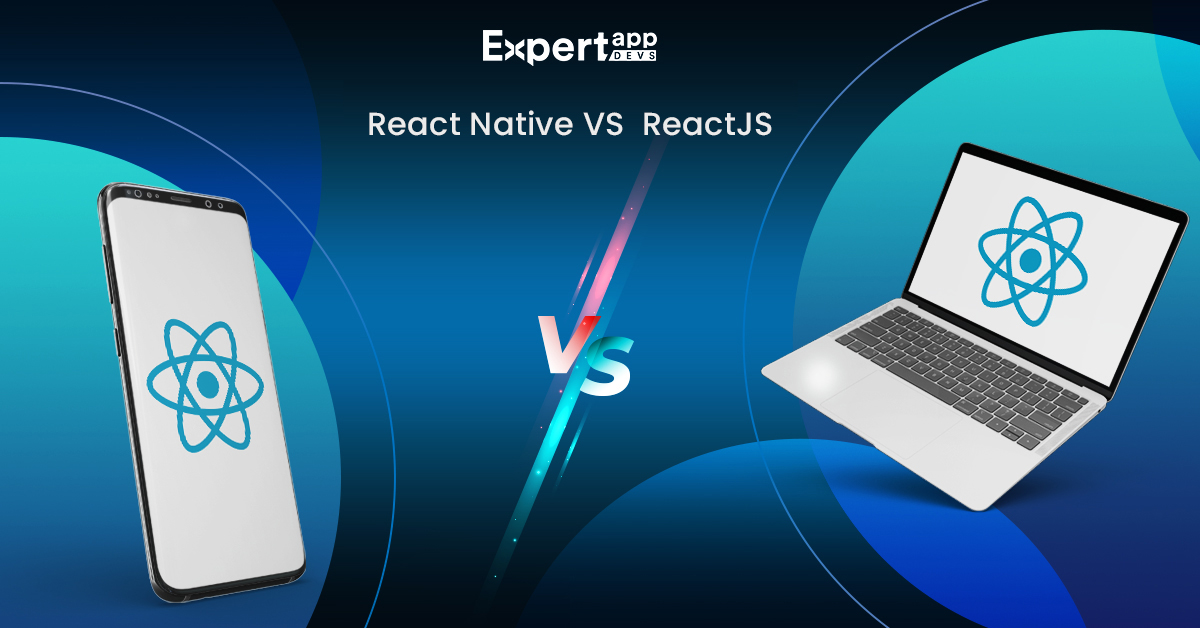React JS vs React Native - Key Differences, Features, Advantages
It is inevitable to have a mobile or web application to reach your target market and increase customer acquisitions. Building an application from scratch can be difficult. It will require more time and, of course, budget.
Frameworks tend to lower the timeline and reduce costs. With the pre-built components and libtable raries, you can accelerate the app deployment.
ReactJS (also known as React) and React Native are popular frameworks that help with web and mobile app development. React builds web apps, while React Native is used to creating mobile applications.
In this React JS vs React Native guide, we will discuss each framework individually before comparing them to see which is better.
An Overview of the ReactJS Framework
If you are planning a website or web application for your business requirements, you should use the ReactJS framework. It is an open-source platform backed by Facebook. Let’s take an in-depth look at this framework.
What is ReactJS?
This is a JavaScript framework backed by Facebook and developed by Jordan Walke in 2011. The framework completed the need for a high-end and dynamic frontend that can improve interactions.
It is majorly used to design front for web applications. The framework is tuned to meet the speed requirements, as it is developed using the JavaScript library. It also determined a unique way of rendering web pages.
The Top Apps Built Using React Framework
| Web App | Description |
| Facebook used the framework to integrate the script into the code so that the interface could be built using components. | |
| Netflix | The framework is used to replace DOM for low-performing TV. |
| PayPal | The app is developed using this web framework to improve the interface experience for the end users. |
The Key Features
Check out all the top features that you will get with ReactJS
- It offers a JavaScript syntax extension that allows the developers to write the HTML structures in the same file that contains their JavaScript code.
- The framework supports a unidirectional data flow and flux, which means it can only handle the data that moves downstream.
- It comes with a lightweight DOM in the virtual mode, which makes it faster. In this case, the VDOM will only change the state of the object that shows any sign of transformation.
- It supports all types of server-side architecture extensions. It can integrate with Redux to improve the rendering.
- Debugging is easy and fast with the ReactJS framework. It provides a large community and suited extension for the same.
- As it operates on virtual DOM, you will notice that it offers excellent performance.
Pros and Cons of ReactJS Framework
| Pros | Cons |
| Virtual Document Object Model helps enhance the speed and overall performance of the application. | The framework lacks proper and complete documentation that can help the developers. |
| It provides the developers with reusable components that speed up application development. | While JSX allows the developer to put HTML and JS in the same code, it can also increase the learning curve. |
| Strong community backing ensures the developers get help when needed. It also ensures there are enough library components and reusable widgets needed for rapid application development. | |
| It is optimized for SEO, which means your app can be discovered with ease. | |
| It is a JavaScript library, which makes it easier to learn the programming framework. |
An Overview of React Native
React Native is a cross-platform mobile app development platform developed by Facebook to enable developers to create interactive interfaces.
What is React Native?
React Native is a front-end framework for cross-platform mobile app development. Meta backs it. Developers use the framework to create apps for both iOS and Android frameworks. The framework is designed to integrate the native app components to build cross-platform app solutions.
The native elements combine with the JavaScript library to enhance app development for businesses. As a result, the app code is rendered as native, enhancing the users' overall experience.
Top Apps Built Using React Native Framework
| App | Description |
| Facebook Ads | The framework helped uncomplicate the app design and development as the logic needed help with handling time differences, ad formats, and other aspects. |
| Walmart | They needed a more user-friendly and usable interface, and React Native happens to be a perfect choice. |
| Bloomberg | This framework automates the code, refreshes, and accelerates deployment. Bloomberg needed both these aspects. |
The Key Features
Let’s look at the top features that make React Native an incredible platform for developing mobile applications.
- You can reuse the components for designing the interface, which reduces development time.
- Write the code once and share it across the platforms, increasing app development speed.
- Hot reload feature allows you to make changes to the production environment, view the changes, and ensure it doesn’t impact the app interface.
- It is a UI-focused mobile app development framework with excellent rendering capabilities.
- It can integrate with third-party libraries for smooth development.
- NPM installation can make speed up the installation process
Pros and Cons
| Pros | Cons |
| A strong developer community that can help you with mobile app development and adding components to the library. | There are fewer custom modules available for development. |
| Allows reusability of code to speed up mobile app development. | It is not very easy to debug the code built using the framework. |
| A low learning curve enables a faster understanding of the code. | The updates are small and slow. |
| Offers multi-platform development. | |
| Excellent rendering that promises good app performance. |
In-depth Comparison Between React JS vs React Native
| Factor | ReactJS | React Native | Winner | Reason |
| Platform Explanation | ReactJS is a JavaScript library that is used to build web apps. | React Native is a framework built on JavaScript technology to develop mobile applications for multiple platforms. | React Native | React Native allows you to use the entire framework to build web and mobile apps. |
| Rendering Method | Instead of the real DOM, React depends on virtual DOM to render the server-side script. As a result, the rendering is fast, and the performance is smooth. | The native elements are used to streamline the rendering processes, resulting in native-like aesthetics and experience. | React Native | It is easier to render with the native components as it offers better functionality and interaction. |
| The UI Rendering | The UI is rendered using HTML for the React library. | The UI is rendered using the JavaScript extension JSX. | React | JSX can be difficult, while HTML comes with a low learning curve. |
| Styling | CSS is used for styling the frontend. | A stylesheet is used for styling the frontend. | React | CSS is easier to learn and adapt. |
| Animation | CSS is used to incorporate animation within the React JS application. | The animation is defined using the API specific to the animation. | React Native | CSS may not be fit for animation. Installing a specific API can help in multiple ways. |
| Performance | It uses the JavaScript library to render the apps, which also impacts the performance. | Uses native components within the framework to render UI. | React Native | The native components can enable faster rendering and improve the app's performance. |
| Used for | Web apps only. | Web and mobile apps. | React Native | It can be used for all types of solutions. |
| Code Reusability | It offers reusing only on Virtual DOM. | You can reuse the code and create apps for multiple platforms with this framework. | React Native | Improves the ability to develop apps for multiple platforms. |
| Top Apps | Uber, Facebook, Airbnb | Facebook, Instagram, Walmart | ||
| Learning Curve | As it uses JSX to develop the interfaces, it can prove to have a high learning curve. | It offers a low learning curve as it uses pre-built components built on the JavaScript library. | React Native | It is easier to learn and supported by a strong community. |
| Installation | This is a JavaScript library, which means you can integrate it with the HTML page. | It is a framework and requires a full-fledged installation. You need to install the tools, create the environment and also prepare the infrastructure for cross-platform development. | React | The installation process is simple and friendly. |
| Efficiency | You can render client-side applications while rendering the server-side. As a result, it is easy to improve developer efficiency as it can handle the low-level and high-level elements in the web application. | Reusable app components with a native-like feel and design can enable better efficiency. They are compiled into the native code, which results in greater efficiency and productivity. | Both | They have their way of improving the developer’s efficiency and speeding up app development. |
| Syntax | You can write the code in JavaScript. It also renders the HTML-like elements within the application. It uses JSX syntax to build the code. However, when the code is compiled, it is entirely JavaScript. | You might want to learn the native-specific code components and syntax that can help you improve app coding. | React | It allows you to use any library that renders HTML and CSS, making it easier for the developer to code and compile their interfaces. |
| Compatibility | It was developed keeping the discoverability and optimization needs of the web app in mind. | The UI needs to be more interactive and engaging for the end users. It offers more responsive elements that can be adjusted to suit specific platforms. | Both | They are each developed keeping in mind the web and mobile aspects of the interface. |
Conclusion
In the debate on React vs React Native, choosing one over the other can be difficult. While one is a JavaScript library brilliant with web application development, the other is a framework devised to build mobile and web applications.
The choice entirely depends on the intended use, the interface requirements, and the developer’s expertise. To develop apps with multi-platform capability, you should go with React Native.
Expert App Devs is a leading mobile app development company in the USA with proficiency in React and React Native frameworks. If you want to build mobile and web apps for your business, connect with our team by filling out the contact us form.
 Jignen Pandya
Jignen Pandya





